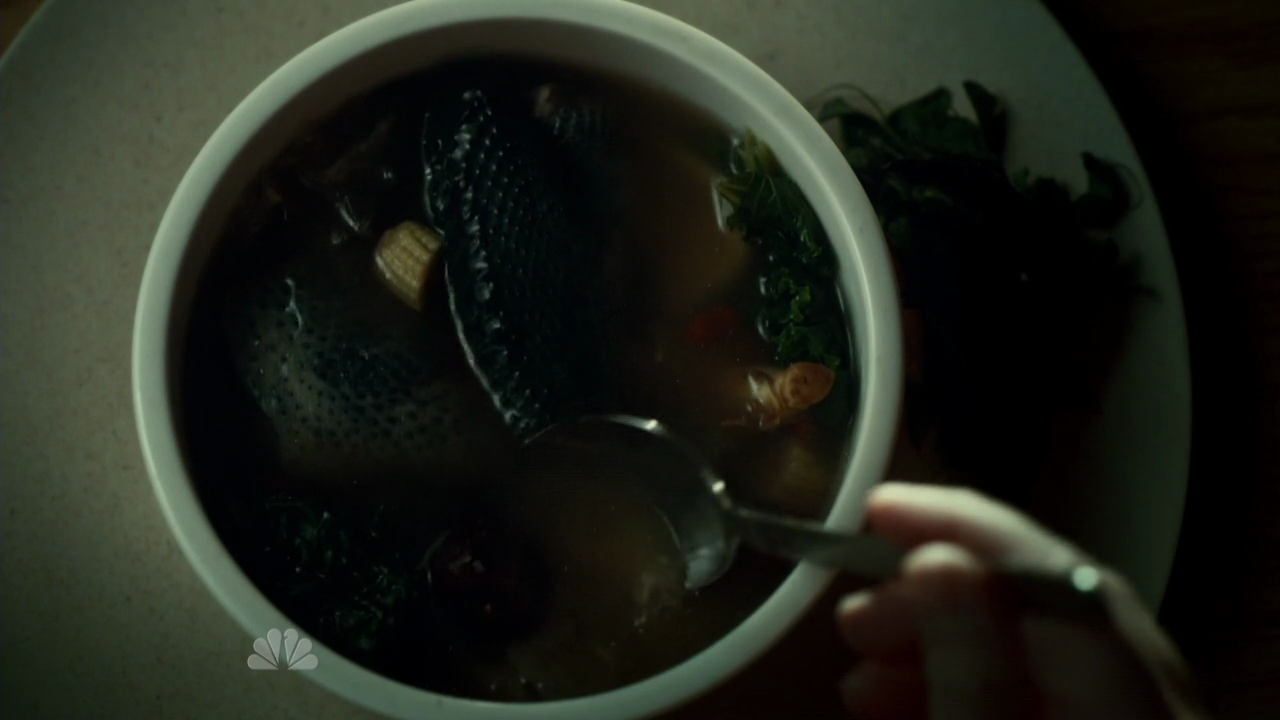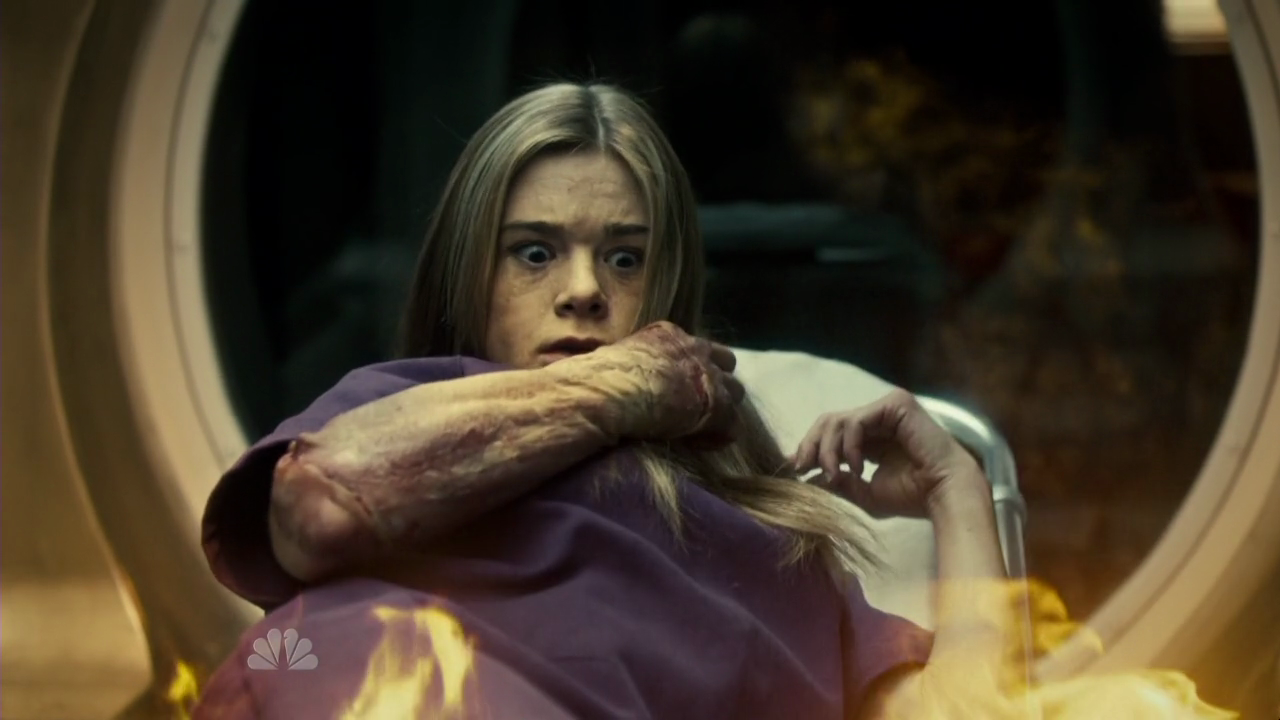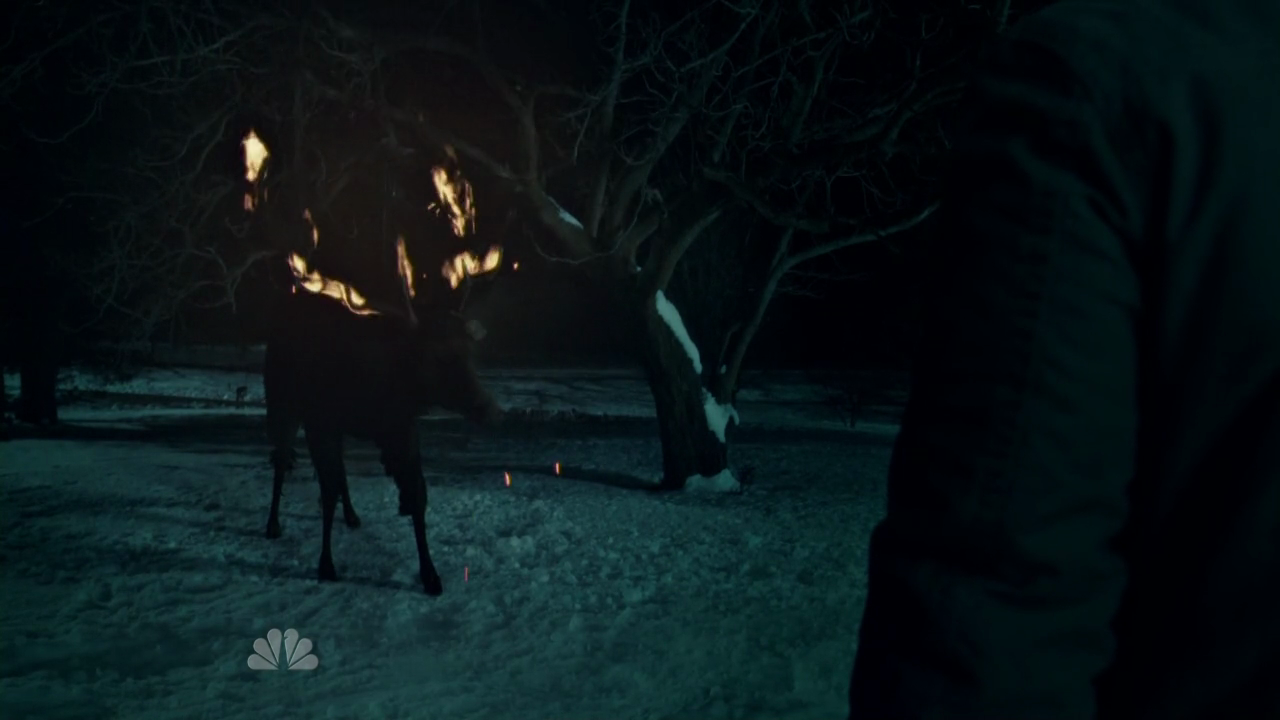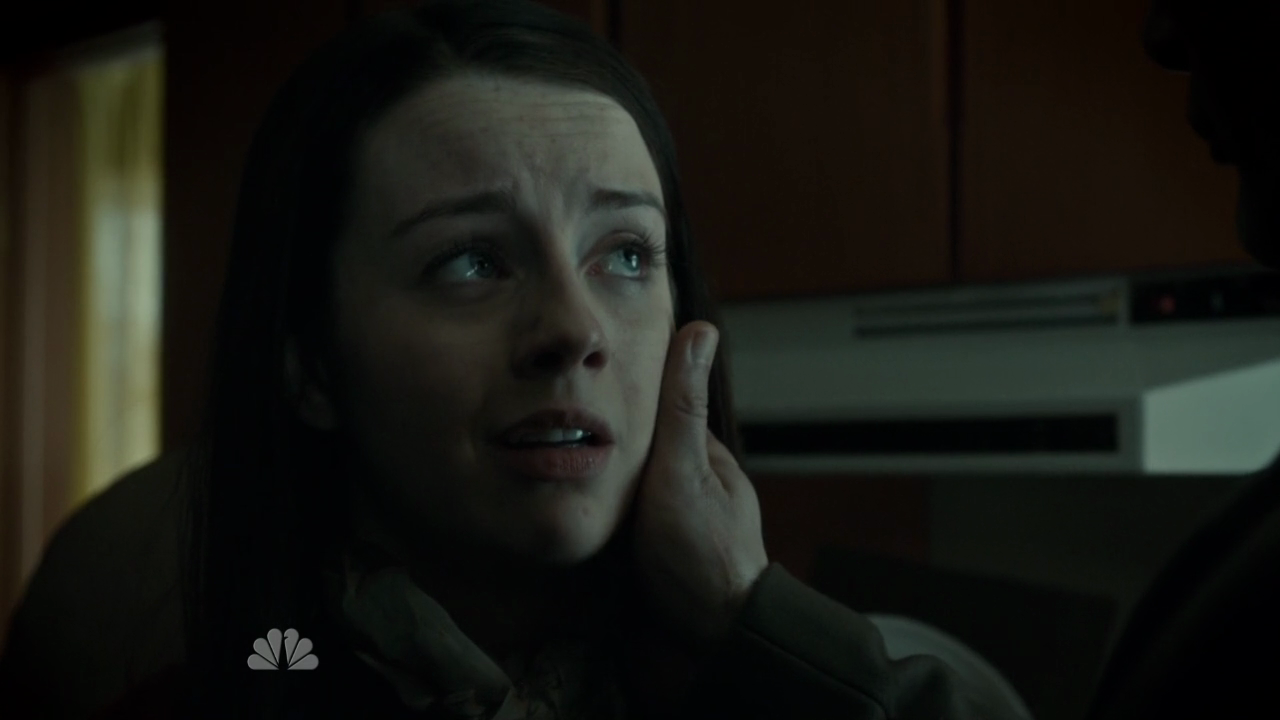Proverbs of Hell 12/39: Relevés
 RELEVÉS: Properly “removes,” but best understood in the sense of a relief pitcher, with the idea being that the course replaces the previous one. In practice, it is the big set-piece course, and so functioning much the same way that “Rôti” did.
RELEVÉS: Properly “removes,” but best understood in the sense of a relief pitcher, with the idea being that the course replaces the previous one. In practice, it is the big set-piece course, and so functioning much the same way that “Rôti” did.
GEORGIA MADCHEN: They say what’s wrong with you?
WILL GRAHAM: Just the fever. They’re trying to find out what else.
GEORGIA MADCHEN: They won’t find anything. They’ll keep looking and keep giving you tests and keep giving you false diagnosis and bad medicine. But they won’t find anything wrong. They’ll just know you’re wrong. (Pause) I hope you have good insurance.
One assumes the FBI has decent insurance, but it’s a delightful joke and, given how little time we actually get to spend with an on-the-mend Georgia, probably the key
The sense of being wrong, as opposed to having something wrong with you, is a deep-seated fear for Will. It’s worth recalling his description of the Chesapeake Ripper as “one of those pitiful things sometimes born in hospitals” that fails to die, a description that puts Hannibal in much the same place.
GEORGIA MADCHEN: They said I might remember what I did. I don’t want to remember.
WILL GRAHAM: You know what you did, Georgia.
GEORGIA MADCHEN: But I don’t remember it. I don’t remember it like I did it. It feels more like some horrible dream where I killed my friend.
Thankfully this comes well after Moffat’s use of a similar line in “The Wedding of River Song,” and so we can safely conclude that any influence was on Fuller and company as opposed to the other way around. Nevertheless, this serves as a late echo of the themes of identity and memory in “Rôti.” What’s striking is the aspirational approach that Hannibal takes to the conjunction of memory and identity. Georgia wants to control what she remembers so she can control who she is.
HANNIBAL: Silkie chicken in a broth. A black boned bird prized in China for its medicinal value since the 7th century. With wolfberries, ginseng, ginger, red dates and star anise.
WILL GRAHAM: You made me chicken soup.
The script calls says, “Hannibal offers a supportive smile. Of course he did,” but Mikkelsen’s reaction, which is considerably funnier, has him looking slightly miffed at Will’s reductiveness. Would Hannibal still have turned on Will if he hadn’t insulted his soup? Probably, but still.
It’s also notable that the black boned chicken makes this one of the rare meals we can confirm is non-cannibalistic. (Although “a broth” offers some concern.)
Amusingly obscured from all subsequent discussion of this murder is how Hannibal successfully tampered with Georgia’s oxygen chamber to both remove her grounding bracelet and slip a plastic comb in. This is probably for the best, as calling attention to it would damage the “he might not literally be the devil” interpretation that the show takes such tortured pains to maintain the faint plausibility of.
Given that Georgia’s issues with memory provide a thematic counterpoint to Gideon, it’s a pity room for her couldn’t be found in “Rôti,” as her swift incineration in this episode seems like a waste of a character who, while she probably didn’t have a substantial arc in her, was still probably good for a few more scenes.
ABIGAIL HOBBS: What are we going to call it?
FREDDIE LOUNDS: Thought about “The Last Victim” but there’s already a book about serial killers called “The Last Victim.”
ABIGAIL HOBBS: Was it a best-seller?
FREDDIE LOUNDS: Oh yeah. Especially after the guy who wrote it killed himself.
ABIGAIL HOBBS: Just as well. Wasn’t really my dad’s last victim anyway, was I?
Freddie can’t possibly not have known about a best-selling book about serial killers by a guy who killed himself, and so this exchange has to be taken as probing for something. But what? The conversation ends up turning to Nicholas Boyle, but by that point in it Freddie has moved on to venting her suspicions about Will Graham, so it doesn’t seem like what she’s driving at. Given her earlier suggestion of focusing Abigail’s book around her father’s eight murders, the interpretation of least resistance would suggest that she’s not entirely sold on Abigail’s denial of involvement in her father’s killings.
Will’s investigative techniques go full Twin Peaks here, as his sole evidence that the copycat killed Georgia is in effect a dream. On the one hand, this is simply part of his story – at this point he’s deep in the mire of his illness and not behaving rationally. On the other hand, it’s worth stressing how little obvious connection there is between Georgia and the existing copycat murders, at least in terms of the evidence that’s visible to Will and company. This is a substantial leap – so much so that Jack subsequently uses it as evidence of Will’s possible mental collapse. And yet Will is in fact correct. So how is he making the leap? The presence of the stag, especially after its guidance in “Rôti,” would suggest a supernatural vision, but in “Rôti” the stag was most easily read as acting on Hannibal’s behalf. Here that doesn’t make sense – Hannibal has nothing to gain and a lot to lose from Will making this connection. It’s possible that Hannibal sends Will this revelation as part of a plan to frame him, but Hannibal doesn’t seem to operate with that level of abstract master plan – his framing of Will is motivated simply by a desire not to be caught himself, and is indeed done with what seems like genuine reluctance. The easiest conclusion, then, is that Will’s gifts are not simply a heightened sense of empathy interacting with the evidence, but a supernatural ability in their own right.
HANNIBAL: You think Will’s protecting her.
JACK CRAWFORD: Has been since he killed her father. Just don’t know from what.
HANNIBAL: I can’t imagine he would hide anything criminal from you. I’ve only ever known Will Graham as a man striving to be his best self.
Hannibal’s final statement here is an astonishingly elegant blend of truth and lies. The first sentence is a straightforward lie, in that Will is hiding something criminal. The second sentence, however, is not only true, but doubly true. On the one hand, it accurately describes Will’s intense rectitude. On the other, it describes the way in which Will, in Hannibal’s view, approaches his murderous ascension.
JACK CRAWFORD: Is it mental illness or does his mind just work so differently we don’t know what else to call it?
Well, it’s neither actually, at least in terms of anything Hannibal and Jack are actually talking about here, but the distinction is worth remarking upon. It is, of course, not a new or clever question for Hannibal to ask. Nevertheless, it is worth noting how comparatively few of the killers on Hannibal are actually portrayed as mentally ill. Georgia Madden is in most regards an exception in actually having a clear diagnosis. Past that, the show is willing to offer at least some credulity to the idea that these murders might be, if not rational per se, at least valid artistic statements.
JACK CRAWFORD: Dr. Du Maurier? I’m Special Agent Jack Crawford with the FBI. I’d like to speak with you about a patient of yours.
One of the most satisfying ways to shift the status quo of a long-form narrative is to have two well-established characters who have never met finally interact. This is doubly true on a show like Hannibal. Not only does this meeting mark the point where Jack officially becomes suspicious of Hannibal (albeit not even remotely suspicious enough), there is simply something fascinating about the prospect of watching these two characters and their particular style of psychological jousting go at each other. It helps, of course, that it’s Laurence Fishburne and Gillian Anderson.
BEDELIA: I know he’s concerned about Mr. Graham and very much wants to help him.
JACK CRAWFORD: I consider Will a friend. And I want to help him, too.
BEDELIA: Seems to me Will Graham could use more friends like Hannibal Lecter.
Bedelia plays both sides in this episode in an interesting way, helping to encourage Hannibal’s games here, but warning Hannibal off of them in a subsequent scene. Her motivation here is on the whole clearer: she is simply curious.
BEDELIA: And evidently he suspects you are protecting Will. Are you?
HANNIBAL: Are you asking as my psychiatrist?
BEDELIA: I’m stepping out of my role as your psychiatrist and speaking to you now as a colleague. Whatever you’re doing with Will Graham… stop.
In the script, Bedelia says “friend,” a more suggestive choice of words given how Hannibal describes Will. This, however, maintains her cool detachment, which is the more pertinent part of her character here. It does, however, make her motivation in this scene more inscrutable given her interaction with Jack. As a friend, Bedelia giving Hannibal the obviously correct (if unsatisfying) advice makes sense despite her curiosity. As a colleague, less so.
WILL GRAHAM: He wasn’t planning on framing her. He was planning on framing me.
HANNIBAL: You believe this is personal.
WILL GRAHAM: If it wasn’t before, it is now.
The tragedy of Will’s inability to identify himself in the picture becomes increasingly intense. But the real question is whether he’s correct that Hannibal was framing him for Sutcliffe’s murder. It changes the complexion of Hannibal’s approach to Will if the point at which he was actively framing him is moved up as this suggests.
HANNIBAL: Will, this is venturing into the paranoid. I can’t allow you to pull Abigail into your delusion.
WILL GRAHAM: This isn’t a delusion. I’m not hallucinating. I haven’t lost time. I am awake and this is real.
Bold words on Will’s part, and like much of the dialogue on Hannibal, neither straightforwardly true nor false.
ABIGAIL HOBBS: Do you ever hunt?
WILL GRAHAM: I fish.
ABIGAIL HOBBS: Same thing, isn’t it. One you stalk, the other you lure.
Abigail makes a crucial distinction, but mistakes it for an irrelevant one. In fact the practices are deeply and fundamentally different, marking one of the fundamental divides that Will and Hannibal’s friendship is based upon.
ABIGAIL HOBBS: Something’s wrong with you. I think you’re still sick.
Here at last the episode’s structure reveals itself, bookended by Will interacting with the two women he’s saved as they discuss and observe the matter of what’s wrong with him.
ABIGAIL HOBBS: Will always said whoever called the house that morning was the serial killer. Why did you really call?
HANNIBAL: I wanted to warn your father that Will Graham was coming for him.
ABIGAIL HOBBS: Why?
HANNIBAL: I was curious what would happen.
It is this instinct, and not his nominal trademark instinct towards cannibalism, that makes Hannibal such a delightful villain. There are many, many good reasons to kill someone, but curiosity is among the finest.
ABIGAIL HOBBS: You wanted me to kill Nick Boyle.
HANNIBAL: I was hoping. I wanted to see how much like your father you were.
ABIGAIL HOBBS: Ohmygod.
HANNIBAL: Nicholas Boyle is more important for you gutting him. He changed you. That’s more important than the life he clamored after.
Here the central motif of Hannibal’s various attempts at taking on some form of apprentice, which is an ascension narrative. With the partial exception of Will, this goes poorly. Abigail’s reaction is probably the most obvious.
Within the values of Hannibal, this more or less assures that Hannibal does not, in fact, kill Abigail. It’s not, obviously, that he wouldn’t, given that he eventually does. But the show’s absolute refusal to allow sex into the psychological mix of murders means that a cliffhanger in which Hannibal displays physical affection for Abigail, even if framed entirely in paternal terms, is deeply unlikely to resolve into murder. Part of this is down to the fact that Harris’s original books are steeped in sex, which means that the show’s complete excision of it leaves a negative space that is at times acutely visible, perhaps most obviously in Garret Jacob Hobbs’s pathology, the sexual dimensions of which remain obvious even as the show aggressively avoids them. To have Hannibal stroke Abigail’s cheek before murdering her would ultimately fail to avoid them, and so cannot possibly be what happened.




June 14, 2017 @ 11:01 am
Interesting. I haven’t watched the show since it originally aired but I remember never being quite certain about Bedelia’s motivations. She seemed to me like both the victim and the apprentice at once. “Curiosity” seems like a deceptively easy answer… but on a second thought it fits surprisingly well. Of couse Hannibal would pick a therapist with the same basic motivation as himself. He’s only ever interested in mirrors and puppets.
And I agree that morbid curiosity is what makes Hannibal a great character. I’ve always preferred curious and impulsive villains to cold, calculating ones. Curiosity gives them a powerful motivation that is both very understandable (as universally human) and completely inexplicable (as what one finds interesting is rarely logical). Impulsiveness makes a villain unpredictable and adaptable. You can’t foil their plan if they’re making it up as they go along.